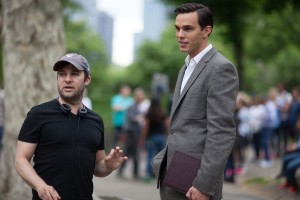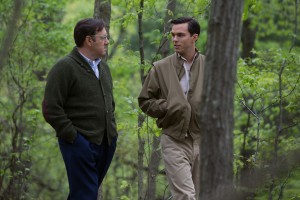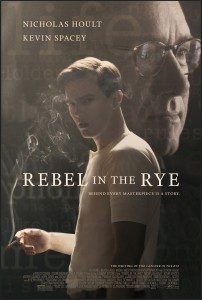Danny Strong is no stranger to fact-based material. He won Emmys for writing and being one of the producers of GAME CHANGE, the HBO film about the John McCain/Sarah Palin White House run. Before that, Strong, who hails from Manhattan Beach, California, was nominated for an Emmy for writing the HBO movie RECOUNT, about the 2000 U.S. presidential election. Strong and Lee Daniels together created the Fox hit EMPIRE, which returns for its fourth season later this month; Strong directed three episodes of the series. On the feature side, Strong wrote the screenplays for THE HUNGER GAMES: MOCKINGJAY PART I and PART II and LEE DANIELS’ THE BUTLER.
Strong had success as an actor before his writing career took off. He is still beloved by fans of BUFFY THE VAMPIRE SLAYER for playing the recurring character Jonathan over all seven seasons, and by GILMORE GIRLS aficionados for his work as Doyle McMaster.
IFC Films’ REBEL IN THE RYE, which opens September 8, marks Strong’s feature directorial debut. Strong also wrote the screenplay and served as one of the producers on the film, inspired by Kenneth Slawenski’s biography J.D. SALINGER: A LIFE. Salinger (1919-2010), played in REBEL by Nicholas Hoult, wrote the seminal novel THE CATCHER IN THE RYE, then became famously reclusive in his later years. Kevin Spacey costars as Salinger’s writing mentor Whit Burnett and Sarah Paulson plays literary agent Dorothy Olding.
Speaking by phone, Strong discusses his directorial debut, BUFFY’s twentieth anniversary, and much more.
ASSIGNMENT X: When did you get the idea to do REBEL IN THE RYE?
DANNY STRONG: I came to this in 2011 or 2012. There was a new biography on J.D. Salinger. I saw it in a bookstore and I bought it out of curiosity, the good old-fashioned way. As I was reading it, I was stunned by his story. I knew nothing about him, I was really taken by it, and when I got into the section of him in the ‘20s and his relationship with his writing professor Whit Burnett and the journey to writing CATCHER IN THE RYE, which included him going to war and experiencing the horrors of World War II, and the fact that [the character] Holden Caulfield [in] THE CATCHER IN THE RYE, was written by a veteran, blew my mind. I thought, “This is an amazing story and deserves to be a film. And since it’s about a writer, I should write it. I can direct it.”
AX: When you were working on it, did you have any concerns about the fact that people often have problems dramatizing the writing process, or did the material speak to you in a way where you went, “I know how to do this”?
STRONG: What spoke to me was what he went through in his journey to try and have a successful career as a writer. I didn’t even know he was this young, ambitious kid in New York City who desperately wanted success, because he was [later] so famous for rejecting success. But that’s not how he began, and what he lived through to try and achieve it was so universal to not only myself, but so many writer friends of mine, and actors, and anyone else that’s doing a career in the arts, what we go through to try and have a successful career, I immediately just thought, “Wow, this could really show what writers go through.”
AX: You’re a writer, and you’re writing about a writer who is writing. Did you get sort of dizzy with the meta of it all at any point?
STRONG: Well, it’s not surprising that there are so many things he goes through that have these universal experiences. But in his case, he ends up going to war, and it’s so much more profound and dramatic than anything anyone I know has gone through, and that’s why it’s worthy of making a film about it. It’s more than just a biopic of J.D. Salinger, it’s this artist manifesto of what it means to be an artist.
AX: We see in the film that Salinger comes to take the concept of writing as an end in itself, for the sake of writing, to an extreme. Do you think there is a happy medium between writing for the sake of writing, rather than for publication or production, or do you think if you believe that the way Salinger did, then you can’t interact with anyone who may have an opinion on the work?
STRONG: I don’t know. I think that that decision ultimately was one that was very personal to him, and clearly, that’s what he wanted to do, because he could have published anything he wanted, and he spent forty to fifty years writing just for himself. So I think that’s a very unique situation. My own personal theory about it is that it ties into the damage from the war, and that the writing became this meditative, therapeutic, religious experience for him that he didn’t want interrupted with the pressures and the headache of dealing with publicity, criticism, fans, et cetera.
Being a novelist is such an individualistic thing. It’s your book, and you have an editor, and I guess the editor’s influence on the book completely depends on your relationship with that editor. But making movies and TV shows and theatre is a very collaborative medium, and there are so many people involved, and it’s so expensive to make any of these things that you don’t get the luxury of saying, “No one can tell me anything, I’m going to the woods and I’m just going to do whatever I want.” It just doesn’t work that way with what I do for a living, so I don’t even have the option to try to be that person. But it’s not part of my own personal DNA anyway. I’m very collaborative and I actually am very reliant on feedback – sometimes too reliant – and like interacting with people and collaborating. I enjoy it.
AX: Have you had mentors that were important to you as a writer?
STRONG: I didn’t have any kind of Whit Burnett figure when I was a young writer at all. I wrote scripts for many, many years before I was able to sell my first project, which was seven years in, but when I did finally sell my first project, which was the movie RECOUNT, the producer on it was this guy named Len Amato, who’s now the president of HBO Films. Len was an extremely helpful figure to me as a writer, and as someone to give me advice, and he certainly has stayed in my life over the years as someone who I go to for advice.
AX: Was directing a feature film pretty much what you expected it would be?
STRONG: I really loved it, but it was really challenging. But it was very rewarding.
AX: Was it more challenging than directing television?
STRONG: Different, but yes, more challenging. You would think you have more time [than on television], but I didn’t feel like I did. I felt like, because it was a lower-budget film, that you’re more at the pace of a TV pace in a way when you’re at that budget level. But I had a great crew and it was a great company.
AX: Had you ever wanted to make a World War II movie before? Not that the whole movie is that, but you have some battle sequences …
STRONG: It wasn’t something I consciously thought about.
AX: Was there anything particularly difficult for you in doing those sequences?
STRONG: Only by the limitations of my budget. It was very low budget, so I had to be incredibly precise in how I was going to shoot these war scenes, and I had to shoot the war scenes all in one day, so it was pretty crazy that we literally shot this entire war in one day [on] Staten Island, at a Boy Scout camp.
AX: Were there any other budgetary issues that affected how you shot REBEL IN THE RYE?
STRONG: In a period piece, to go wide in a city shot means you’ve got cars, and extras, and wardrobe, and all these things that we couldn’t afford. So I was very calculated on when and where I could go wide. And so it’s usually in a park or the wilderness, or someplace where I don’t have to deal with cars and extras and wardrobe, because I couldn’t afford them.
AX: You made the choice in REBEL to often be tight on your characters …
STRONG: There are plenty of wides [wide shots] in those scenes, but it’s an intimate movie about this guy and his relationship with writing and the people around him, so it’s not a Terence Malick movie, it’s a film that’s really about the psychology of this individual. So being closer to him and the people around him is going to penetrate into that story.
AX: How did you come to cast Nicholas Hoult as J.D. Salinger?
STRONG: It was a very thoughtful, very deliberate, very lengthy process. I believed that the success or failure of this film completely depended on whoever was playing that part, that that casting was everything, and because it was my [feature] directorial debut, I felt like there was no more important decision I could possibly make for my future as a director than who was going to play that role, so no pressure, right? [laughs] So I very slowly started watching reels and footage of all these actors in that age range, and there are a lot of really talented, wonderful actors. When I got to Nick Hoult, I was just blown away by his versatility. From film to film, he would transform into a completely different character, from WARM BODIES to A SINGLE MAN to the X-MEN movies to MAD MAX: FURY ROAD. He really reminded me of Gary Oldman in his genius character actor ability, so I put him on my very short list of actors that I was going to ask to audition for me. And I ended up asking five really terrific actors, if they would read for me, and four of them did, and of the four, Nick’s audition just blew me away. I thought, “Okay, that’s my guy.” So he got the part the good old-fashioned way – he came and auditioned.
AX: And Kevin Spacey?
STRONG:. Kevin is someone whose voice is often in my head when I’m writing certain roles, and it was very true for Whit Burnett. So he was always at the top of my list. I think he’s one of the great actors of our times, and of all times. So I just offered a Hail Mary of, “Fingers crossed, do you think Kevin would do this?”, and then to my great, immense joy, he said yes.
AX: And Sarah Paulson was in GAME CHANGE as Nicolle Wallace …
STRONG: When I was casting the film, it at the height of Sarah Paulson mania, when THE PEOPLE V. O.J. SIMPSON was airing. She was the biggest actress in the country, and I didn’t think I could get her, and she said yes to me without reading the script. It was amazing.
AX: And at least one of your BUFFY acting colleagues is in the film …
STRONG: Yes, Adam Busch is in REBEL IN THE RYE. He was also in EMPIRE, and he’s a very close friend of mine, but also an amazing actor. I just think the world of Adam as an actor, and he’s been working nonstop since BUFFY and I think he’s going to have a very long career moving forward. He’s on a Netflix show [ALTERED CARBON].
AX: 2017 is the twentieth anniversary of the BUFFY THE VAMPIRE SLAYER series. Any thoughts about that?
STRONG: Amazing. I mean, how awesome is that – twenty years later, people still care and love the show. Sarah Michelle Gellar came to my REBEL screening last [week], so I got to see Sarah, and it’s just been so neat, it makes me feel sentimental for the show. I’m still so honored that I was part of that iconic moment in television.
AX: What surprised you the most about Salinger, that he was so ambitious to begin with?
STRONG: Yeah, that was surprising to me, because he’s famous as a quote-unquote recluse, and yet he was incredibly ambitious, and what really blew me away was that he was a veteran of World War II, and that THE CATCHER IN THE RYE, that Holden Caulfield was written by someone who had been institutionalized after the war, and seemed to have very clear PTSD symptoms.
AX: Do you have any seminal experiences in your life that have shaped your writing?
STRONG: I can’t think of one thing – I think it’s just many experiences over the course of all my experiences. I think being an actor is a huge part of what has formed my abilities as a screenwriter.
AX: You’re still acting on occasion …
STRONG: Yes. I do about a job a year. I do something if it’s a really neat part on a really great show. I was on BILLIONS last season, and I will be back on it this season. That’s literally the perfect job for me – it’s a terrific show, such a cool part, and it’s been a lot of fun working on it.
AX: Does acting inform your writing by immersing yourself in somebody else’s writing, or does it clear your head because you’re doing something different and then going back to writing?
STRONG: I think it does both. It definitely clears my head, which is great, because I’m immersed in something else, but I’m also dealing with someone else’s writing in very intimate way, and in a different way than I do as a writer myself, and I’m sure it’s helpful to my writing.
AX: How involved are you in EMPIRE at this point?
STRONG: I’m still involved in a managerial way, but definitely not day to day, like I was the first two seasons. The show’s going great. I think [executive producers] Ilene Chaiken and Sanaa Hamri and the writing staff are doing a great job.
AX: Are the characters on EMPIRE going to be affected by what’s going on in the U.S. at all?
STRONG: EMPIRE has a political component to it, definitely. There are elements of social justice and politics that infuse their way into the show.
AX: With everything that’s happened in the U.S. lately, would you say REBEL is more timely, less timely, as timely as it would have been no matter what happened …?
STRONG: I think that story is a timeless story, no matter what’s happening. It’s about one of our greatest writers creating his masterpiece, and how art is created through trauma, and I think that story is important for any age.
AX: Going forward with your career, do you feel like you’re going to be doing what you had planned to be doing in any case, or has the political environment changed at all your ideas about what you’d like to do?
STRONG: I think the times absolutely affect where your mind is at. Where your mind is at absolutely will dictate what kind of stories you’ll ultimately want to tell, so for sure. You can’t help but not be affected by the times. At least, I can’t.
AX: Do you think you’ll write anything about last year’s election?
STRONG: The truth is that I wrote RECOUNT five and a half years after that [2000] election, and I wrote GAME CHANGE two-and-a-half years after the [2008] election, so I really think a little perspective is important. And also, I read historical accounts of what happened, and it’s from those historical accounts I determine if I think there’s a movie in there. Because it’s not about doing it just to retell the facts, but is there a story that is worth telling that is more than just the sum of the events that happened.
AX: And what would you most like people to know about REBEL IN THE RYE?
STRONG: Please go see it. I think it’s a really profound American tale that I’m so honored that I got to write and direct. I’m really proud of REBEL. I think it’s just really a beautiful, wonderfully acted movie about how J.D. Salinger wrote CATCHER IN THE RYE. But also it tells this universal story of what it takes to create art, and the challenges that the writer and the artist goes through. So many of the things he goes through to begin his writing career is what so many things that me and my friends went through, and the adversity that you face and the people that doubt you, and the constant rejection, and the psychological pain it inflicts upon you, and I think to be able to tell the story of what it is to be a writer, while at the same time telling the story of how J.D. Salinger wrote CATCHER IN THE RYE is really cool and really exciting, and I’m just excited for people to get to see it.
Follow us on Twitter at ASSIGNMENT X
Like us on Facebook at ASSIGNMENT X
Article Source: Assignment X
Article: Exclusive Interview with director Danny Strong on REBEL IN THE RYE
Related Posts:














